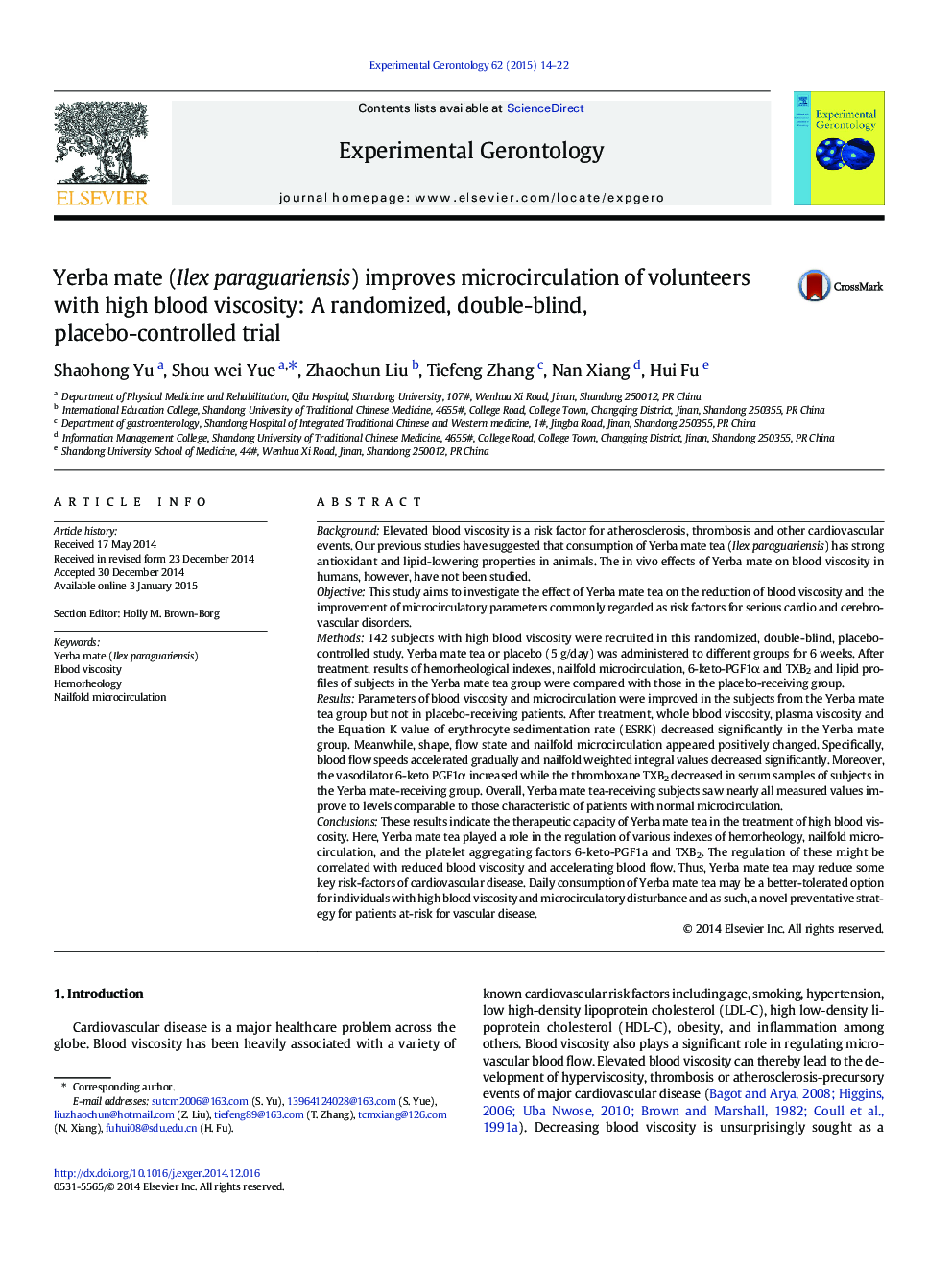| کد مقاله | کد نشریه | سال انتشار | مقاله انگلیسی | نسخه تمام متن |
|---|---|---|---|---|
| 1906227 | 1534879 | 2015 | 9 صفحه PDF | دانلود رایگان |

• Yerba Mate improved microcirculation of patients at risk for cardiovascular disease.
• Yerba Mate improved blood aggregation factors contributing to impaired blood flow.
• Yerba Mate normalized plasma lipids clinically tied to cardiovascular disease.
• Yerba Mate may be an effective alternative for cardiovascular disease prevention.
BackgroundElevated blood viscosity is a risk factor for atherosclerosis, thrombosis and other cardiovascular events. Our previous studies have suggested that consumption of Yerba mate tea (Ilex paraguariensis) has strong antioxidant and lipid-lowering properties in animals. The in vivo effects of Yerba mate on blood viscosity in humans, however, have not been studied.ObjectiveThis study aims to investigate the effect of Yerba mate tea on the reduction of blood viscosity and the improvement of microcirculatory parameters commonly regarded as risk factors for serious cardio and cerebrovascular disorders.Methods142 subjects with high blood viscosity were recruited in this randomized, double-blind, placebo-controlled study. Yerba mate tea or placebo (5 g/day) was administered to different groups for 6 weeks. After treatment, results of hemorheological indexes, nailfold microcirculation, 6-keto-PGF1α and TXB2 and lipid profiles of subjects in the Yerba mate tea group were compared with those in the placebo-receiving group.ResultsParameters of blood viscosity and microcirculation were improved in the subjects from the Yerba mate tea group but not in placebo-receiving patients. After treatment, whole blood viscosity, plasma viscosity and the Equation K value of erythrocyte sedimentation rate (ESRK) decreased significantly in the Yerba mate group. Meanwhile, shape, flow state and nailfold microcirculation appeared positively changed. Specifically, blood flow speeds accelerated gradually and nailfold weighted integral values decreased significantly. Moreover, the vasodilator 6-keto PGF1α increased while the thromboxane TXB2 decreased in serum samples of subjects in the Yerba mate-receiving group. Overall, Yerba mate tea-receiving subjects saw nearly all measured values improve to levels comparable to those characteristic of patients with normal microcirculation.ConclusionsThese results indicate the therapeutic capacity of Yerba mate tea in the treatment of high blood viscosity. Here, Yerba mate tea played a role in the regulation of various indexes of hemorheology, nailfold microcirculation, and the platelet aggregating factors 6-keto-PGF1a and TXB2. The regulation of these might be correlated with reduced blood viscosity and accelerating blood flow. Thus, Yerba mate tea may reduce some key risk-factors of cardiovascular disease. Daily consumption of Yerba mate tea may be a better-tolerated option for individuals with high blood viscosity and microcirculatory disturbance and as such, a novel preventative strategy for patients at-risk for vascular disease.
Journal: Experimental Gerontology - Volume 62, February 2015, Pages 14–22